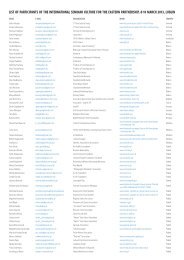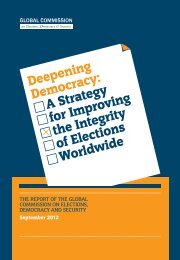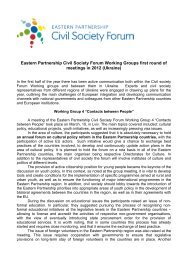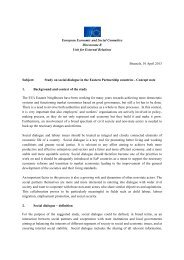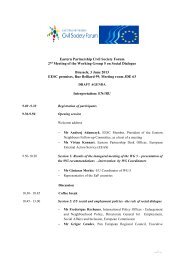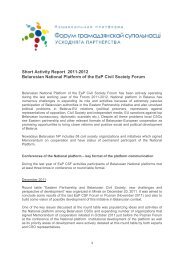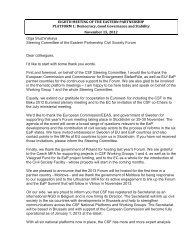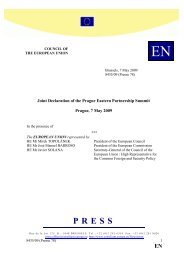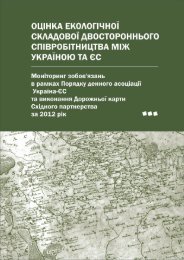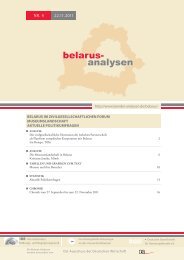Non-formal education - Eastern Partnership Civil Society Forum
Non-formal education - Eastern Partnership Civil Society Forum
Non-formal education - Eastern Partnership Civil Society Forum
You also want an ePaper? Increase the reach of your titles
YUMPU automatically turns print PDFs into web optimized ePapers that Google loves.
For <strong>education</strong>al training programs for managers and professionals a special permit (license) issued<br />
by the Ministry of Education is needed.<br />
Thus, system of training and retraining of specialists in the field of public economics and management<br />
in the Republic of Belarus is preserved and is functioning quite well. Almost all universities, as metropolitan<br />
and regional, have faculties or centers for retraining and skills development, in many ministries and<br />
agencies similar independent departmental institutes and training centers are created and functioning.<br />
Every year over 530 thousand peopleof 5 thousand professions go through training. The greatest<br />
number of workers covered by one year of professional training, there are in the following industries:<br />
“Industry” (220 thousand people), “Education” (60.5 thousand people), “Construction” (57.3 thousand<br />
people), “Health, Physical Education and Welfare” (42.9 thousand), “Transport” (29.4 thousand).<br />
Trainings for the released and the unemployed citizens are provided by employment services 29 .<br />
Despite the impressive numbers, there are a number of disadvantages, which are due to just a low<br />
degree of reforming the sector, they are:<br />
– A low level of response to changes in external social and economic conditions, progress in the<br />
development of science and technology, especially of the Belarusian economic model;<br />
– A clear predominance of fundamental and theoretical knowledge over practice orientation<br />
rarely brought to the teaching faculty of practice;<br />
– Excessive conservatism in the <strong>education</strong>al process, dominated by lectures and seminars,<br />
where active forms and methods of teaching are rarely used;<br />
– Lack of evidence-based set of requirements to the frequency, duration and purpose of<br />
professional development;<br />
– Weak association of institutions of training and retraining to the real economy and the labor<br />
market requirements.<br />
3. Problems and prospects of development of non-<strong>formal</strong> adult <strong>education</strong><br />
in the Republic of Belarus<br />
The Republic of Belarus is now feeling the effects of the majority of trends that define and promote<br />
the development of adult <strong>education</strong> in Europe. Directly it concernsnon-<strong>formal</strong> <strong>education</strong> as an important<br />
tool not only for the development of human capital and the quality of life, but also to strengthen the<br />
country’s competitiveness in the context of globalization and internationalization as well: the next 10<br />
years, about 80% of currently used technologies will obsolete, 80% of employees will have <strong>education</strong>,<br />
received more than 10 years ago, an increase in the quality requirements of the labor force, due to the<br />
aggravation of international competition, the rapid development of technology, increasing the need<br />
for continuous updating of knowledge and skills and the development of professional and personal<br />
skills 30 .<br />
Global challenges such as the threat of ecological disaster also put new challenges in changing<br />
the world and updating the knowledge of adults who should be responsible for making decisions that<br />
determine the lives of future generations. Participation in decision-making requires not only understanding<br />
of current issues and ideas about how the political system and the willingness to participate in the<br />
political process. Without the development of civic <strong>education</strong> to achieve this objective in Belarus will be<br />
impossible.<br />
At the beginning of our review of the prerequisites for the development of non-<strong>formal</strong> adult <strong>education</strong><br />
in present-day Belarus, we highlighted the emergence of a new type of query on the result of <strong>education</strong><br />
on the part of consumers. At the same time, it should be noted that the role of the “customer” of non<strong>formal</strong><br />
<strong>education</strong> today should be played not only by citizens, but also by the state itself. Moreover, in<br />
29<br />
Проект «Концепции Государственной программы развития дополнительного образования взрослых на 2012-<br />
2016 годы». Access mode: http://edu.gov.by/ru/main.aspx?guid=17771<br />
30<br />
Проект «Концепции Государственной программы развития дополнительного образования взрослых на 2012-<br />
2016 годы». Access mode: http://edu.gov.by/ru/main.aspx?guid=17771<br />
47



